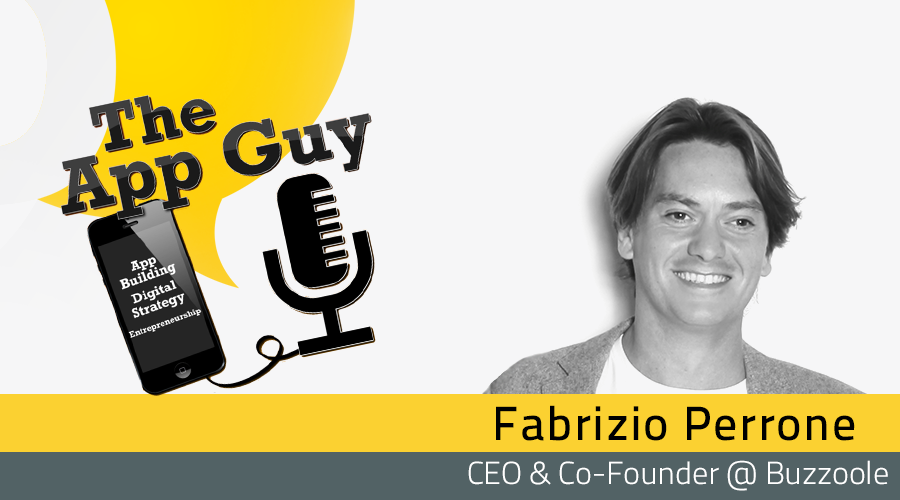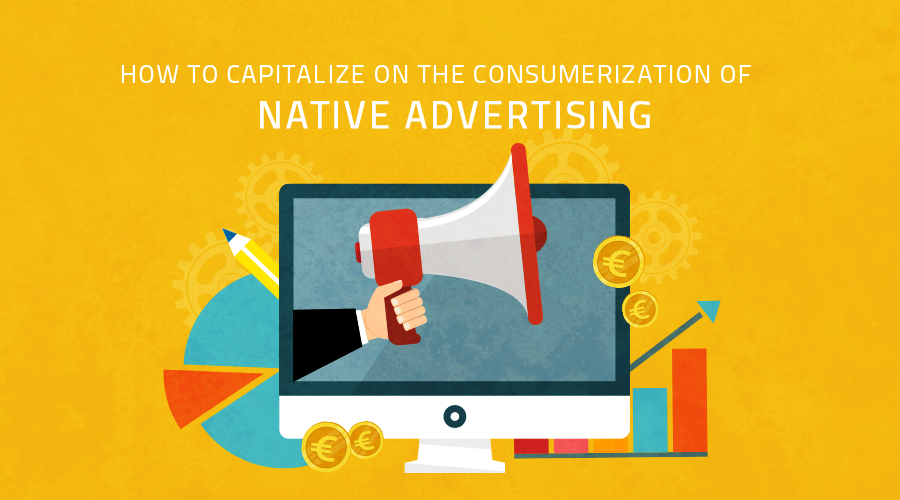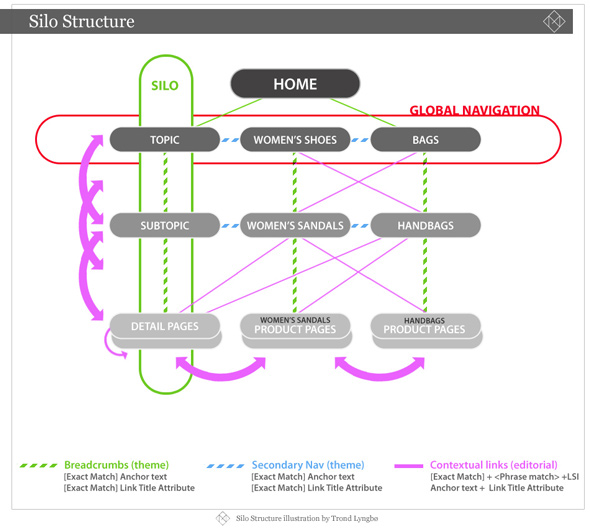Paul Kemp, creator of The App Guy Podcast, helps entrepreneurs take inspiration from the failure and success stories told by his guests. He has already recorded over 400 episodes with startup founders, app developers and digital nomads from around the world. This time he interviewed, Buzzoole CEO and Co-Founder, Fabrizio Perrone.
Influencers can be key for leveraging social media networks, increasing exposure and driving sought after word of mouth recommendations for products and brands. Especially now, when marketers are facing a situation of the global rise of ad blocking, influencer marketing has become more important than ever. Influencers are in the spotlight, bringing the significance of celebrity endorsements down.
About the importance and effectiveness of influencer marketing, the success story that stands behind Buzzoole, as well as his personal journey, Fabrizio talked to Paul. Listen to the podcast now or read the transcription of it below!

Fabrizio is CEO and Co-Founder at Buzzoole, a self-service Influencer Marketing Platform that automates the process of identifying, connecting, engaging, delivering and measuring valuable influencer marketing campaigns.
Serial startupper since 2007, he was among the first in Italy to deal with Buzz Marketing.
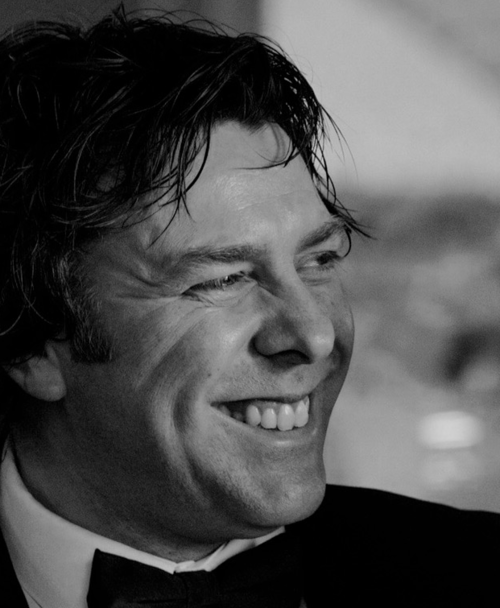
Paul Kemp is an app entrepreneur, podcaster and active maker and launcher of apps and online tools. He’s in the top 10 most active makers in the world on Product Hunt and has helped to launch a #2 chart topping recipe app and a #1 music app on Apple’s App Store.
He’s probably best known for hosting “The App Guy Podcast” which is in its third year and has over 400 recorded episodes with founders and app entrepreneur guests from around the world.
Paul: Welcome to another episode of The App Guy Podcast. I am your host, it’s Paul Kemp. This is the show that gets the best CEOs, the best founders, so that you can do something awesome with your life, understand how it is these people are successful, and you can then learn from these people, these founders, these entrepreneurs, so that you can become successful as well.
I do go around the world, and I am in a wonderful location because in Italy there’s a terrific startup that’s actually starting to take over the world. The name of the company is Buzzoole, and it’s the CEO and co-founder I have today. His name is Fabrizio Perrone, and he is the CEO of Buzzoole. Fabrizio, welcome to The App Guy Podcast.
Fabrizio: Hi, Paul.
Paul: Thanks for coming on. So I know that Buzzoole is a very innovative startup. It’s certainly innovative in terms of big data and predictive analysis, and has won loads of awards. I think you’ve been nominated as Top 15 European Startup, and you have a massive growth rate.
Fabrizio: Okay, so we created Buzzoole with the main goal of unifying the power of word of mouth and the digital PR campaign and the conversation effect to the media investment, with the easiness of display advertising purchasing. I had previous experience in a digital PR and social media agency, and I understood all the inefficiencies of this industry. We tried to solve these, and thanks to the technology we were able to develop a platform that was defined by VentureBeat as “the Google AdWords of buzz marketing” , so a platform where brands can schedule their digital PR investment so they can create conversation about their brands in a genuine way, by themselves, putting the budget they want with a pay-as-you-go model. Of course, the basis of this platform is a huge technology that is able to analyze more than 1,000 influential topics inside the conversation of our user and to understand and detect real influencers in each market.
Paul: This is great. So, as I understand it, you were looking at the inefficiencies of hiring a PR agency. This is usually very expensive. So, you went out to help brands by getting mentions from top influencers. Is that right?
Fabrizio: Yes – Not really just top influencers, because our goal is to go beyond celebrities. I said that the influencer market is in a hype, and a lot of brands care about getting mentioned by celebrity X or Y. What we are trying to teach is that involving real people is much more effective and efficient in terms of investment. Of course, if you need to engage with the top 5 influencers of a specific industry, in a specific country, probably you don’t need any technology, you don’t need any agency, because you already know who they are, and you already know how to engage with them. You just call them, ask them how much they want, you pay them and you engage with them. Our logic is different. Try to find not just five celebrities, but try to find 50 or 100 common people, that have a real influence and an authentic audience in this specific topic, and try to engage with them in a genuine way; so not just paying them, but involving them with brands experience thanks to our gamification system. Thanks to this approach, we can have campaigns that are much more effective, because they are perceived as being much more genuine, and this will amplify the engagement of that campaign, and the engagement is on average up to ten times more than the celebrities’ campaign, just because these people are closer to their audience and are perceived as more genuine. On the other side, it’s much more efficient because, of course, involving a large number of people could be very costly if you do it manually. But if you do it with the help of technology, you can save up to 90% of the internal management cost, and the final result is that, compared to the same reach, our customers are saving 70% of their investment, and they are able to plan this budget with the same easiness of a display budget. They can put the budget they want, they can stop the campaign, they can optimize it, they can monitor it in real time, watch ROI analytics and so on.
Paul: So let me try and understand it, and also help the listeners to understand it. Obviously, it would be easier for them to go to your site, Buzzoole.com . So, I, as a brand, I have the ability to pay for lots of ordinary people to be promoting me, rather than paying a huge amount for a celebrity, for example Kim Kardashian, to tweet about me. It’s better to go to the people that have real engagement, the ordinary people. Is that right?
Fabrizio: Yes. We recently released some content titled, “Move over, Kardashians. How the average Joe’s are changing the influencer world”, because thanks to data, we analyze the engagement rate and the cost to a celebrity, as opposed to a real influencer, as we call it.
On average, real influencers have an engagement rate that is 25% higher than a celebrity’s, and they have a cost per engagement that is about 3%. So, of course, it’s a more efficient segment to involve. This doesn’t mean that celebrities are completely worthless. Of course, for certain reasons, for certain brands, involving a celebrity could be the right choice, for example for a positioning need. But in terms of efficiency of the investment, and to consider this kind of investment not as a special project as a launch, but as a new media channel where brands have to invest in an always-on way, this is the way to do it.
Paul: So you have some amazing brands that you have worked with: Red Bull, Nissan, Bacardi, Ford, Alfa Romeo Sa��a�Sthese are huge brands. Tell me how you encourage the users to talk about the brand? How does that actually work from the user perspective?
Fabrizio: On the user side, they are included in a wider gamification system. Users can sign up to our platform and connect their social accounts, and have a free dashboard where they can learn how their influence is declined through social media, and then they can use a free tool to improve their influence and personal branding. For the user side, we are like a gym to their personal branding, and (of course) they can be involved with the brand they love, for campaigns. Mainly, they are getting three kinds of rewards: first of all, they are getting visibilitya�Sa��a�Sgrowing into our platform, earn badges, earn ranking, give visibility to them. A lot of users that grew thanks to our platform and our technology now have direct relationships with top brands, so they can grow thanks to our platform. They can earn an exclusive experience with a brand, being chosen in campaigns, and they can also earn credits doing several actions within the platform, not just participating in the campaign. They can convert these credits into Amazon gift cards when they reach a certain level. We try to engage with users in a genuine way, trying to get them rewards for the action that they took within the platform. Of course, we try to engage with them in the sense of adding value to the branda��s brief. Also, thanks to the badges and the exclusive rewards for the best creator, who have the best engagement, and so on.
Paul: Fabrizio, I’m loving this chat because you’re reminding me of a chat that I had three years ago now, when the show just started, about tapping into influencers, and if anyone’s interested they should contact me and I’ll let them know exactly what episode that was. So I’m going to try and understand you, what Buzzoole isa�Sa��a�SIa��m going to summarize what I’ve learned from you.
I believe it’s a way of tapping into your connections with your brands, using my social accounts.
I connect them, you help me grow my social accounts, and I get rewarded with credits and through other experiences. What actually happens – How do I promote the brand? Do I just choose what they will automatically tweet or post image-wise, or do I have some involvement in how I promote the brands on there?
Fabrizio: No, we never do automatic content, or stuff like that, because we really want users to be able to add value to the brand’s content. Of course, the type of posts could change to suit certain goalsa�Sa��a�Sit could be a blog campaign, a Twitter or an Instagram campaign – So depending on the channel there will be different types of content, but usually, you receive from the brand all the information to create your own content, with certain specifics, like hashtags, or something like that. So you create you content, saying whatever you think about these brands and these specific activities. It could be a second screen campaign related to the television. We are doing lots of campaigns with, for example, Master Chef or X Factor, to obtain second screen attention, or more traditional campaigns for product launches, contests, sample campaigns where brands send samples to users and they want to get product reviews or very vertical Instagram campaigns. Other brands are using us to push their social content, in substitution to Facebook advertising. For example, in that case, users have to create buzz around the social content of a specific brand.
Paul: This is fascinating, and it’s relevant to our discussion here. This is a show about apps, and you have your own app, as well. How does the app integrate with the platform, Buzzoole?
Fabrizio: The app allows users to connect the accounted, managed campaign that they have on their desktops. We are now releasing a new version that will improve all the functionalities.
Of course, the app is really important for us because it’s the way to reach our users in a faster way. Our focus will be stronger and stronger on the mobile app.
Paul: Also, I was listening to you describe the brands, and I wondered how the brands retained control over what you post because I could imagine they want to only encourage positive promotion, and nothing too negative or, I guess, crude. How do they stop the bad posts?
Fabrizio: On average, you have to consider that users who are participating in our campaigns and that are subscribed to our platform want to grow, and they want to be trusted influencers.
The main resource that every influencer has is his credibility, so doing something completely against a brief is something bad for the influencer’s reputation. Brands can, of course, create briefs that leave higher freedom to the user, or can enable a feature that is called “double-check”, which is like a pre-approval of the content. This is recommended for brands that could have legal problems or something like that; when the user prepares the post, they can ask the user to send a draft through the platform to pre-approve it, or ask for any changes.
Paul: Great. On this show, Fabrizio, there has been a long-running theme of understanding the real problem that the founder is trying to solve, and I think what you’re trying to solve is this problem of people spending a lot of time on social media, building up influence, but not getting any reward from the platforms, or not getting any reward from brands for word of mouth. You’re actually stepping in and saying, “Hey, you’ve got this influence, youa’ve spent a lot of time building up your influence, here’s how you earn rewards from just doing what you’re normally doing on social media”. Does that sound like the problem you’re solving?
Fabrizio: Yes, of course. We are trying to create a loyal community, a loyal brand ambassador community. This is something different because influencer marketing is not something new, we didn’t invent anything. We are trying to make an existing process more efficient. Of course, if you look for a platform that could pay you for something that you post, you can find tons of platforms that could do that. What we are trying to do as a unique selling proposition is to combine our technology to really individuate a specific user that could have an influence on a specific topic, and engage with him in a genuine way. Also, helping them to grow in terms of personal branding, and as a genuine brand ambassador, so not like a paid user that could one day, for example, talk about an automotive brand, and a week later talk about computers. We want to help users to stay close and to get rewards for promoting brands they love.
Paul: Wonderful. So there are two more things that we need to do with you, Fabrizio, before we say goodbye. One is that we always like to try and understand the success that you’ve had, and try to, in a way, copy from you the lessons that you’ve learned. So could you talk through the growth of Buzzoole, and if there’s been any point in time that has just been quite unique in terms of a spike in subscribers or publishers? What was the big spike, and has there been a big spike in your growth, over the years that you’ve been going?
Fabrizio: Of course in terms of clients we’ve had a huge growth. If you consider that we launched our product in June 2014, and we were about 5 people, and at the end of 2014 -6 months later- Swe had more than 250k in revenues and we were 10 people. In 2015 as a whole we had a growth of 30% month over month; starting with revenues of 30k/month, at the end of the year we will have more than 200k/month in revenue. We’re close to more than 1.5 million of revenue in 2015, and we are more than 30 people. We are opening in London, we have been chosen by Unilever as one of the best 15 startups in Europe, and we also entered into a UK program called Global Entrepreneurship Program by the UK government, so the UK government is also helping u. Thanks to The Bakery, which is one of the best accelerators in London, we are also entering into the UK market. I think these are the most impressive metrics. In terms of users, we also had a huge growth. Until April 2015, we had something like 15,000 and now we have more than 60,000, so it’s four times what we had eight months ago. In terms of staff, we are now more than 30.
I just hired one person in the UK that is refusing a Facebook offer to come into our project, so this is amazing, we are very proud of it. Our future plan is to create metrics into the UK, and by September open a new round to go to the U.S.
Paul: That sounds fascinating. So the final thing to talk about is to understand your personal journey. Many people listening to this are considering becoming founders of their own startup, or working for a startup. In your opinion, is it worth the ups and the downs, and the pain that you have to go through to become an entrepreneur, become a founder? What would you say to anyone who is thinking about going into that lifestyle?
Fabrizio: I can say that it’s really difficult. If you see a company that is going well, you just see that, but you don’t see all the pain, all the bad moments that the founders went through and, of course, we had a lot of those. We had lots of good moments, we had lots of celebrations, but we also had lots of moments where it seemed to be really difficult. I can remember challenges in terms of finding the right people. In June 2014, when we were launching the product, we had one month of cash left, and we were starting to get some clients, but we were really risking running out of cash. The best talent that you can have is determination. Never give up, and always believe that you can do it. I know it might sound clich, but it is true. I had previous experience in other companies, and this is my second startup, to be honest. After my degree, I started a company, in 2008, and I sold that company in 2013, so I already had more experience. My first company was a digital marketing agency that was focused in Italy. It was not about international growth, it was about getting clients in Italy. We were a small agency, we were lucky and were able to sell the company, but we had to create a new team that had all the required competencies and the determination – those were the most important needs for a successful startup.
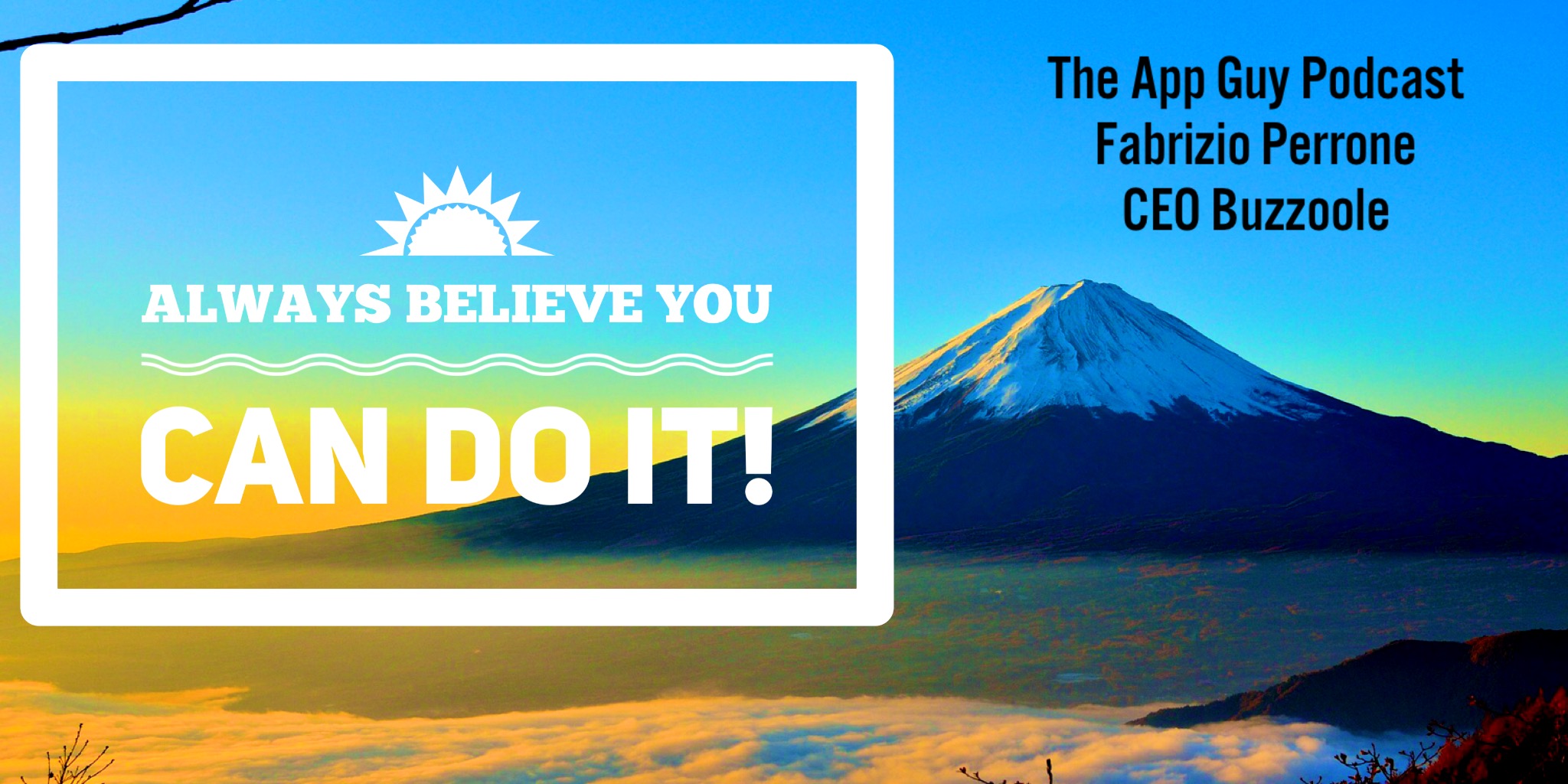
Paul: I love that. I loved the quote that you said, “Always believe you can do it”, that’s what I’m taking away from you. Fabrizio, this has been a wonderful chat.
Fabrizio: Thank you.
Paul: For everyone listening, you can go to theappguy.co and search episode 417, and you’ll get links to Fabrizio and the actual platform, Buzzoole. But for now, Fabrizio, how can people connect with you on Buzzoole? What’s the best way of getting in touch?
Fabrizio: Of course, people that would like to have more information can drop us a line at info@Buzzoole.com, or just subscribe to the platform to have your dashboard and your social analytics technology. For all the brands that could be interested, you can reach us at brands.buzzoole.com. You can follow us on Facebook, on Twitter and you can ask for a live demo in the brands platform, so you have a lot of ways to get connected with us. You can also follow me, I am @fabrlzio on Twitter. Let’s keep in touch!
Paul: Well, thank you very much for coming on this show, and talking us through your journey. This is why I do this podcast, to understand the real story, the ups and the downs.
